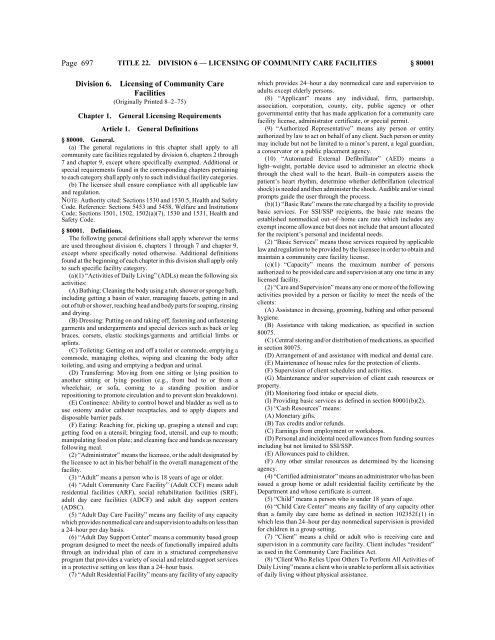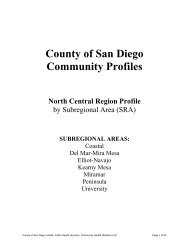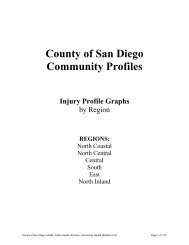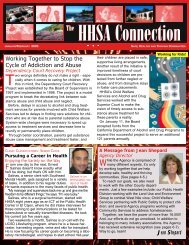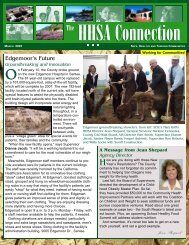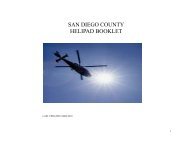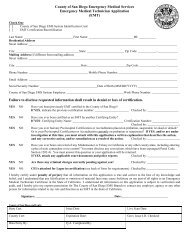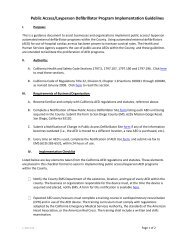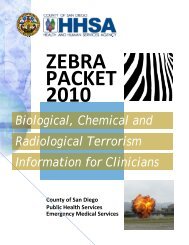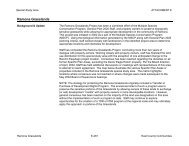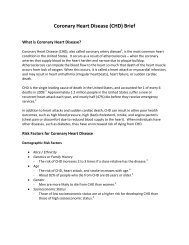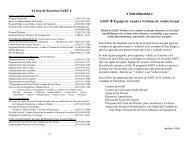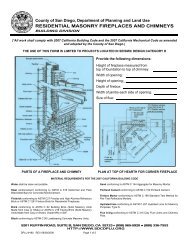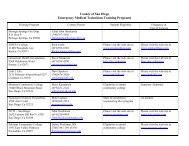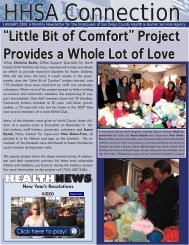CALIFORNIA CODE OF REGULATIONS - State of California
CALIFORNIA CODE OF REGULATIONS - State of California
CALIFORNIA CODE OF REGULATIONS - State of California
Create successful ePaper yourself
Turn your PDF publications into a flip-book with our unique Google optimized e-Paper software.
Page 697<br />
TITLE 22. DIVISION 6 — LICENSING <strong>OF</strong> COMMUNITY CARE FACILITIES § 80001<br />
Division 6.<br />
Licensing <strong>of</strong> Community Care<br />
Facilities<br />
(Originally Printed 8–2–75)<br />
Chapter 1. General Licensing Requirements<br />
Article 1. General Definitions<br />
§ 80000. General.<br />
(a) The general regulations in this chapter shall apply to all<br />
community care facilities regulated by division 6, chapters 2 through<br />
7 and chapter 9, except where specifically exempted. Additional or<br />
special requirements found in the corresponding chapters pertaining<br />
to each category shall apply only to such individual facility categories.<br />
(b) The licensee shall ensure compliance with all applicable law<br />
and regulation.<br />
NOTE: Authority cited: Sections 1530 and 1530.5, Health and Safety<br />
Code. Reference: Sections 5453 and 5458, Welfare and Institutions<br />
Code; Sections 1501, 1502, 1502(a)(7), 1530 and 1531, Health and<br />
Safety Code.<br />
§ 80001. Definitions.<br />
The following general definitions shall apply wherever the terms<br />
are used throughout division 6, chapters 1 through 7 and chapter 9,<br />
except where specifically noted otherwise. Additional definitions<br />
found at the beginning <strong>of</strong> each chapter in this division shall apply only<br />
to such specific facility category.<br />
(a)(1) “Activities <strong>of</strong> Daily Living” (ADLs) mean the following six<br />
activities:<br />
(A) Bathing: Cleaning the body using a tub, shower or sponge bath,<br />
including getting a basin <strong>of</strong> water, managing faucets, getting in and<br />
out <strong>of</strong> tub or shower, reaching head and body parts for soaping, rinsing<br />
and drying.<br />
(B) Dressing: Putting on and taking <strong>of</strong>f, fastening and unfastening<br />
garments and undergarments and special devices such as back or leg<br />
braces, corsets, elastic stockings/garments and artificial limbs or<br />
splints.<br />
(C) Toileting: Getting on and <strong>of</strong>f a toilet or commode, emptying a<br />
commode, managing clothes, wiping and cleaning the body after<br />
toileting, and using and emptying a bedpan and urinal.<br />
(D) Transferring: Moving from one sitting or lying position to<br />
another sitting or lying position (e.g., from bed to or from a<br />
wheelchair, or s<strong>of</strong>a, coming to a standing position and/or<br />
repositioning to promote circulation and to prevent skin breakdown).<br />
(E) Continence: Ability to control bowel and bladder as well as to<br />
use ostomy and/or catheter receptacles, and to apply diapers and<br />
disposable barrier pads.<br />
(F) Eating: Reaching for, picking up, grasping a utensil and cup;<br />
getting food on a utensil; bringing food, utensil, and cup to mouth;<br />
manipulating food on plate; and cleaning face and hands as necessary<br />
following meal.<br />
(2) “Administrator” means the licensee, or the adult designated by<br />
the licensee to act in his/her behalf in the overall management <strong>of</strong> the<br />
facility.<br />
(3) “Adult” means a person who is 18 years <strong>of</strong> age or older.<br />
(4) “Adult Community Care Facility” (Adult CCF) means adult<br />
residential facilities (ARF), social rehabilitation facilities (SRF),<br />
adult day care facilities (ADCF) and adult day support centers<br />
(ADSC).<br />
(5) “Adult Day Care Facility” means any facility <strong>of</strong> any capacity<br />
which provides nonmedical care and supervision to adults on less than<br />
a 24–hour per day basis.<br />
(6) “Adult Day Support Center” means a community based group<br />
program designed to meet the needs <strong>of</strong> functionally impaired adults<br />
through an individual plan <strong>of</strong> care in a structured comprehensive<br />
program that provides a variety <strong>of</strong> social and related support services<br />
in a protective setting on less than a 24–hour basis.<br />
(7) “Adult Residential Facility” means any facility <strong>of</strong> any capacity<br />
which provides 24–hour a day nonmedical care and supervision to<br />
adults except elderly persons.<br />
(8) “Applicant” means any individual, firm, partnership,<br />
association, corporation, county, city, public agency or other<br />
governmental entity that has made application for a community care<br />
facility license, administrator certificate, or special permit.<br />
(9) “Authorized Representative” means any person or entity<br />
authorized by law to act on behalf <strong>of</strong> any client. Such person or entity<br />
may include but not be limited to a minor’s parent, a legal guardian,<br />
a conservator or a public placement agency.<br />
(10) “Automated External Defibrillator” (AED) means a<br />
light–weight, portable device used to administer an electric shock<br />
through the chest wall to the heart. Built–in computers assess the<br />
patient’s heart rhythm, determine whether defibrillation (electrical<br />
shock) is needed and then administer the shock. Audible and/or visual<br />
prompts guide the user through the process.<br />
(b)(1) “Basic Rate” means the rate charged by a facility to provide<br />
basic services. For SSI/SSP recipients, the basic rate means the<br />
established nonmedical out–<strong>of</strong>–home care rate which includes any<br />
exempt income allowance but does not include that amount allocated<br />
for the recipient’s personal and incidental needs.<br />
(2) “Basic Services” means those services required by applicable<br />
law and regulation to be provided by the licensee in order to obtain and<br />
maintain a community care facility license.<br />
(c)(1) “Capacity” means the maximum number <strong>of</strong> persons<br />
authorized to be provided care and supervision at any one time in any<br />
licensed facility.<br />
(2) “Care and Supervision” means any one or more <strong>of</strong> the following<br />
activities provided by a person or facility to meet the needs <strong>of</strong> the<br />
clients:<br />
(A) Assistance in dressing, grooming, bathing and other personal<br />
hygiene.<br />
(B) Assistance with taking medication, as specified in section<br />
80075.<br />
(C) Central storing and/or distribution <strong>of</strong> medications, as specified<br />
in section 80075.<br />
(D) Arrangement <strong>of</strong> and assistance with medical and dental care.<br />
(E) Maintenance <strong>of</strong> house rules for the protection <strong>of</strong> clients.<br />
(F) Supervision <strong>of</strong> client schedules and activities.<br />
(G) Maintenance and/or supervision <strong>of</strong> client cash resources or<br />
property.<br />
(H) Monitoring food intake or special diets.<br />
(I) Providing basic services as defined in section 80001(b)(2).<br />
(3) “Cash Resources” means:<br />
(A) Monetary gifts.<br />
(B) Tax credits and/or refunds.<br />
(C) Earnings from employment or workshops.<br />
(D) Personal and incidental need allowances from funding sources<br />
including but not limited to SSI/SSP.<br />
(E) Allowances paid to children.<br />
(F) Any other similar resources as determined by the licensing<br />
agency.<br />
(4) “Certified administrator” means an administrator who has been<br />
issued a group home or adult residential facility certificate by the<br />
Department and whose certificate is current.<br />
(5) “Child” means a person who is under 18 years <strong>of</strong> age.<br />
(6) “Child Care Center” means any facility <strong>of</strong> any capacity other<br />
than a family day care home as defined in section 102352f.(1) in<br />
which less than 24–hour per day nonmedical supervision is provided<br />
for children in a group setting.<br />
(7) “Client” means a child or adult who is receiving care and<br />
supervision in a community care facility. Client includes “resident”<br />
as used in the Community Care Facilities Act.<br />
(8) “Client Who Relies Upon Others To Perform All Activities <strong>of</strong><br />
Daily Living” means a client who is unable to perform all six activities<br />
<strong>of</strong> daily living without physical assistance.


